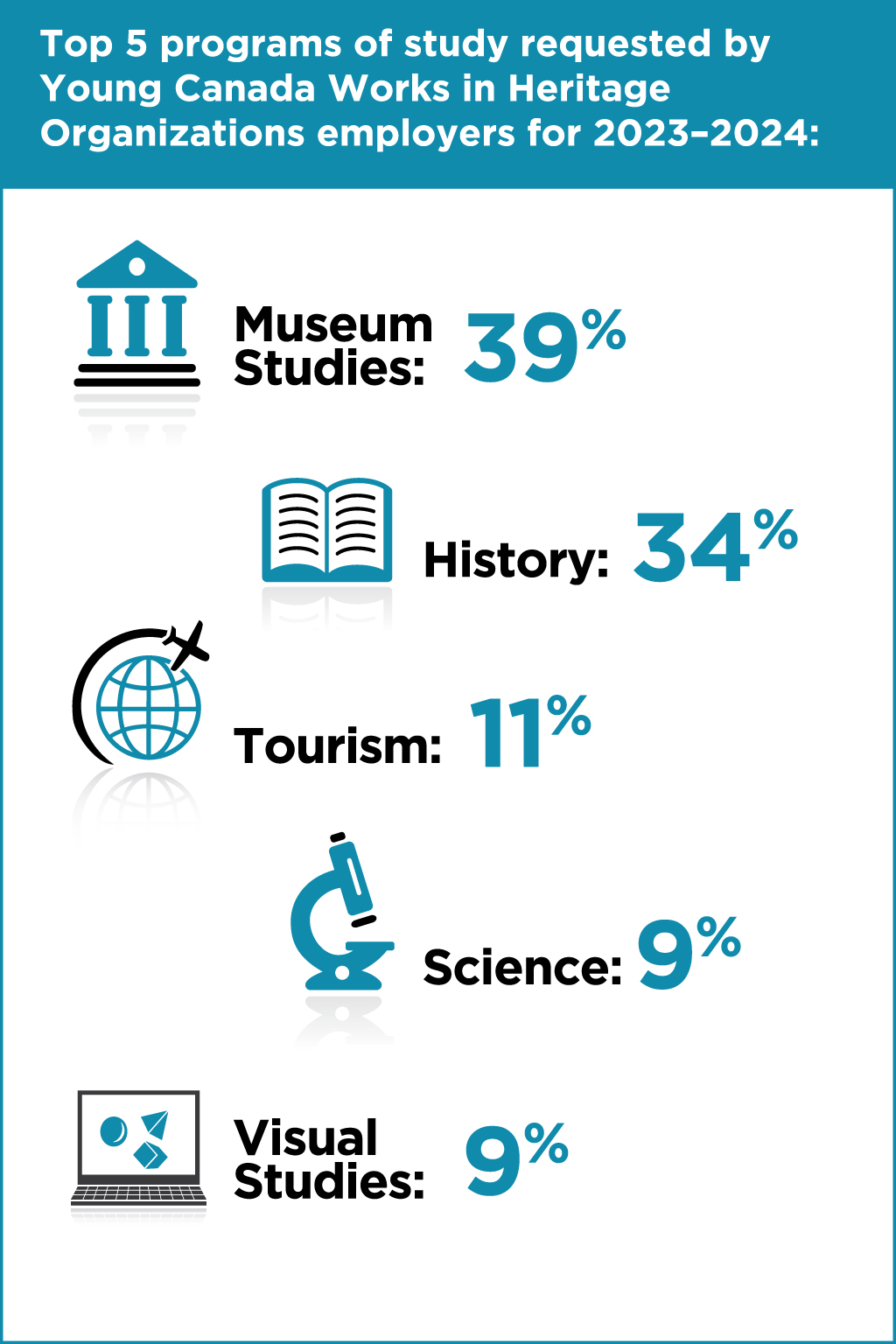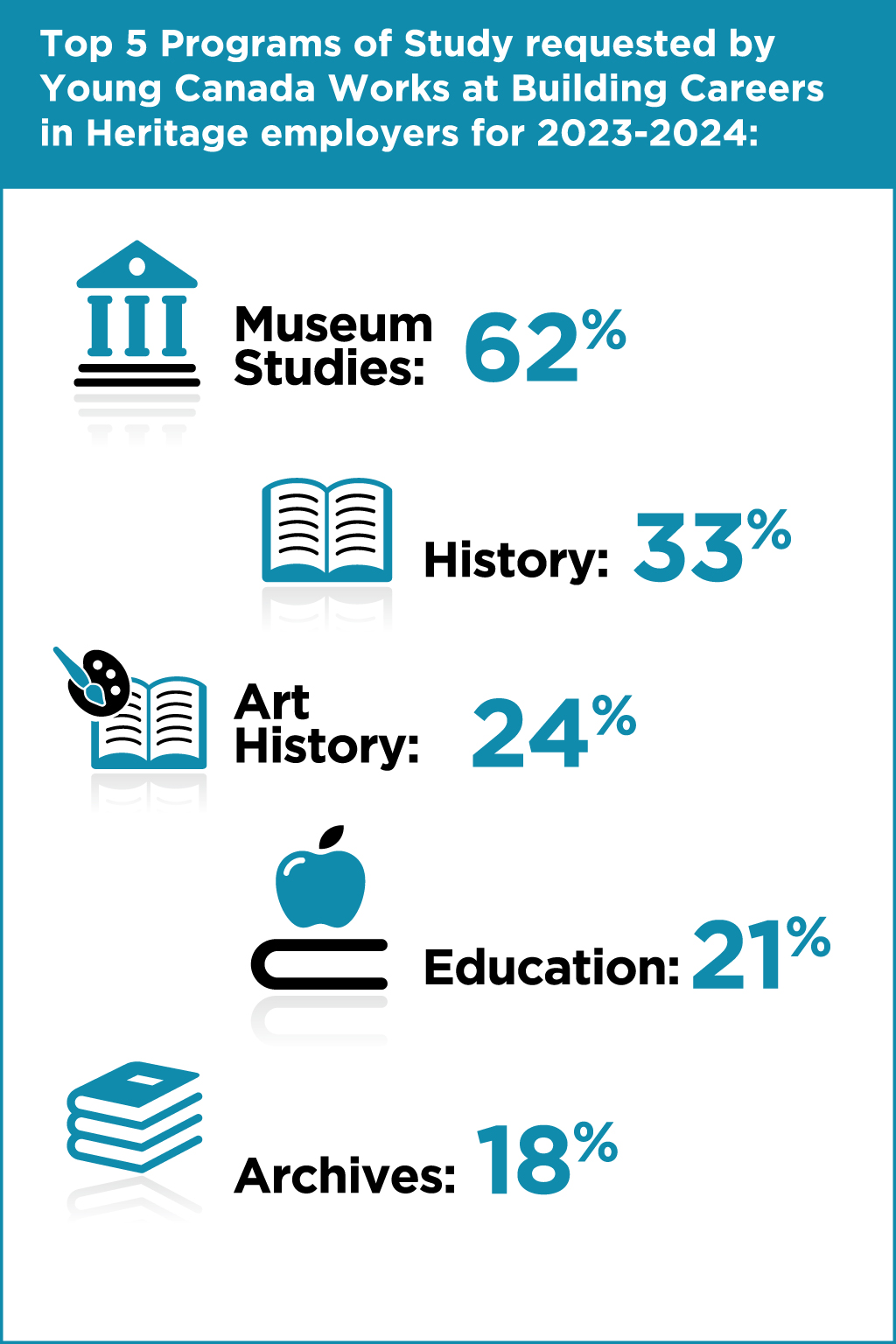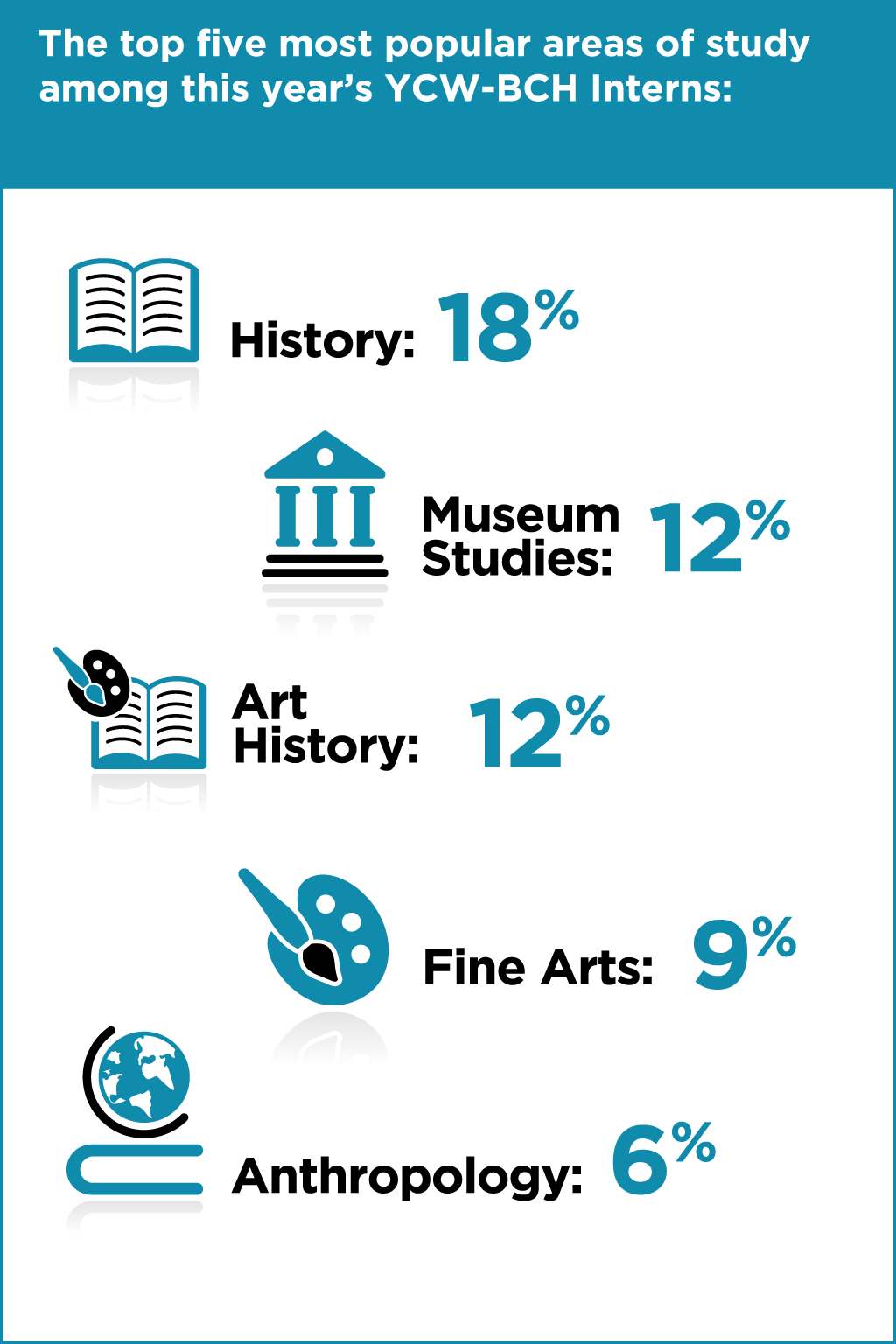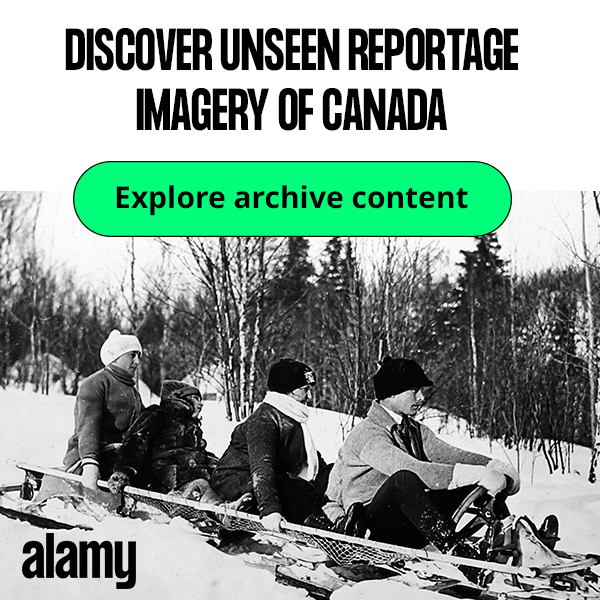Young Canada Works And Museum Studies
Louise Pitre
From the perspective of the Young Canada Works program, there are no specific requirements for the educational experience of participants. Specific requirements can, however, be set by employers and are communicated through the job posters displayed on the YCW job board. These requirements will vary depending on the position and the needs of the organization.
Young Canada Works sets out broad eligibility requirements in terms of expectations for participants’ education. For the Young Canada Works in Heritage Organizations stream, the only requirement is that participants are currently enrolled in either high school or a post-secondary program. On the other hand, the Young Canada Works’ internship stream, Building Careers in Heritage, requires participants to have graduated from a post-secondary program. Completed programs can include a diploma, certificate, bachelor’s degree, or post-graduate degree.
Young Canada Works Program Officers have access to program data from funding applications, job posters final reporting. Given the important role the program plays in creating entry level museum roles nationally, we have found it worthwhile to analyze this information as a means of understanding hiring trends in entry-level work in the museum sector. Below we have analyzed job poster data from both CMA-delivered program streams to identify skills and education trends in entry level short-term positions and internships within Canada's museum sector. Approximately 10% of Young Canada Works in Heritage Organizations’ job posters were surveyed to determine which educational backgrounds were being sought by employers. YCW-HO offers employers an opportunity to hire a youth for a short-term work placement of 6 to 16 weeks. Although the YCW-HO stream is intended for both current secondary and post-secondary students, a majority (60%) of job posters specify a preference for applicants with experience in a particular field of university study extending from first-year university to masters-level studies. The other 40% make no mention of any educational expectations.
While many employers provide a short list of preferred programs of study, 30% of job posters surveyed suggest that they were open to hiring students from “other relevant programs”. In addition, some job posters indicated that “relevant experience” could substitute for education. Most interestingly, a very small percentage (0.008%) of employers insisted that applicants be currently enrolled in a museum studies program. Only 39% of job posters included museum studies among other desired programs of study.
In addition to the top five most requested areas of study, 22 fields of study were also mentioned as relevant, including Indigenous Studies, Theatre, Public History, Education and Fine Arts.

In short, while experience in History and Museum Studies programs appears to be highly sought after, employers are interested in a diversity of skillsets and tend not to be prescriptive when it comes to their employees’ educational backgrounds, providing multiple options for applicants.
We also analysed the Job Posters for Young Canada Works at Building Careers in Heritage, the longer of the two streams of YCW administered by the CMA. YCW-BCH provides work opportunities of 4 to 12 months for post-secondary graduates. Among the 217 job posters prepared by Young Canada Works at Building Careers in Heritage employers for positions taking place in 2023-2024, more than 49 different courses of study were mentioned as desirable for applicants to have completed. 34 job posters, or 16% of total positions, didn’t mention any specific academic requirements for potential applicants. The majority of employers (53%) who provided a list of preferred educational programs were also open to any other relevant course of studies. Of the total number of job posters, only 7, or 3%, required applicants to have taken a museum studies program, while 62% include Museum Studies as a suggested course of study. Much like the job posters for the Heritage Organizations stream, a large percentage, 42%, of job posters indicated that employers were open to other related fields of study.
While Museum Studies is considered relevant by a majority of employers, it is certainly not considered mandatory. The skillsets and knowledge from other programs are also valued within museum work generally. ‘Museum Studies’ can supplement and build upon other courses of study and is often taken by YCW-BCH candidates as a post-graduate diploma or degree complementing their first degree. Some employers also requested that interns have taken classes in ‘Arts Management’ or ‘Museum Management’ which could be considered Museum Studies, much as Public History, Anthropology, and other programs which include content relevant to the work of museum professionals.

Actual Experience of Interns
As mentioned above, those eligible for a YCW-BCH internship must have completed a certificate, diploma or degree from a recognized post-secondary institution. We’ve reviewed what YCW-BCH employers were looking for in terms of educational background, what post-secondary training had this year’s interns taken?
This year’s current YCW-BCH interns have completed 327 post-secondary programs in total. 263 of these programs are bachelor’s degrees, certificates, or diplomas, 62 are master's degrees and two are PhDs (both in Art History).

The remaining 44 subject areas, which include disciplines such as library studies, Indigenous Studies, Archives, Sciences, Communications, make up 41% of the total completed programs.
History and Museum Studies are the top requested programs by employers in both streams of YCW as well as being the top academic programs completed by YCW-BCH interns for this year but we can see that there is a significant gap between students who have taken history museum studies and the number of positions requesting it. This shows flexibility on the part of the museum employers but what else might it suggest? Also, a further analysis of Museum Studies curricula would be interesting to determine if they cross-reference with any other subject matter (for example, Tourism) as requested by employers above.
The skills sought by Young Canada Works’ heritage sector employers are diverse, varying across hiring organizations and types of advertized positions. Although Museum Studies is still in high demand in the sector, it does not seem to be necessary for employment in the YCW Heritage program. For students who pursue this credential, it may make them more attractive candidates, particularly as they apply for jobs that require for museum-based skills. Museum Studies courses, including training in specific conservation skills, can be completed during or after completing a YCW position and, while valuable, aren’t a requirement for participation in the program. One of the main benefits of Young Canada Works is that it helps provides the work experience in the heritage sector sought by many employers. It can also help encourage those who may not have considered themselves as potential museum workers and whose academic training background doesn’t relate directly to public heritage to reconsider themselves as potential museum workers and seek out additional training in museum studies programs.
Louise Pitre is a Program Officer with Young Canada Works at Building Careers in Heritage and a YCW Communications Liaison with the Canadian Museums Association.
Young Canada Works Heritage provides funding to employers to create jobs for students and internships for graduates. These programs help youth acquire skills in the heritage, arts and cultural sector.
